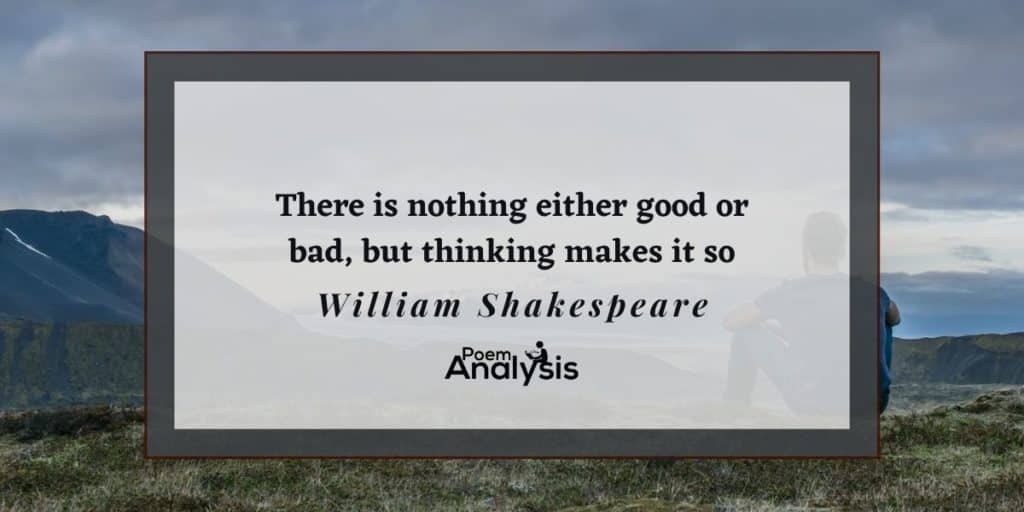Hamlet delivers the quote as he considers how he is imprisoned by Denmark and the King, as well as by his mind. His knowledge of the murder of his father, the previous king, by King Claudius, is inescapable.
“There is nothing either good or bad, but thinking makes it so” Meaning
The quote means that one’s perspective changes everything. Because Hamlet knows the truth of King Claudius his rise to power, he is restless and feels as though he has been imprisoned within his own country. He wishes that he could set aside his knowledge and live ignorant of what’s going on around him, but he can’t.
Where Did Shakespeare Use the Quote?
This quote appears in Act II, Scene 2 and is spoken by Hamlet in the tragedy of the same name. The quote is part of a conversation that he is having with Guildenstern and Rosencrantz. The two are friends of Hamlet’s, or at least acquaintances, from university. King Claudius brought them to Denmark with the intention of having them spy on Hamlet.
Claudius knows that Hamlet’s state of mind is suffering. This is due both to Hamlet’s feigned madness as well as what many readers suspect is true insanity. Here is the quote in context:
Why, then, ’tis none to you, for there is
nothing either good or bad but thinking makes it
so. To me, it is a prison.
Hamlet speaks these lines in response to these lines of dialogue:
Hamlet: What have you, my good friends, deserv’d at the hands of
Fortune, that she sends you to prison hither?
Guildenstern: Prison, my lord?
Hamlet:
Denmark’s a prison.
Rosencrantz: Then is the world one.
Hamlet:A goodly one, in which there are many confines, wards, and
dungeons, Denmark being one o’ th’ worst.
Rosencrantz: We think not so, my lord.
Here, it becomes clear that when Hamlet says “prison,” he’s referring to the confines of his country—Denmark. Hamlet is confined and at the mercy of the leaders of his country, including King Claudius, who he believes murdered his father and the men that the king employees, including Rosencrantz and Guildenstern. At the same time, Hamlet is also a prisoner of what he knows—that Claudius killed his father and took over the throne, which should’ve been Hamlet’s.
When Hamlet uses the famous quote, “There is nothing either good or bad, but thinking makes it so,” he is referring to his understanding of the situation that he’s in. He wishes that his “thinking” would allow him to live out his life and ignorance, unknowing of what’s going on around him. But this isn’t the case. He’s a prisoner of his knowledge.
Why Did Shakespeare Use the Quote?
Shakespeare uses this quote in order to describe Hamlet’s internal suffering. He is a prisoner twice over, once by the country of Denmark and the concerns he has about the King (and the King’s men (like Rosencrantz and Guildenstern)), and by his own mind. He knows that the current king killed the previous, Hamlet’s father. His knowledge of this tragic death haunts him, as do his intentions to get revenge.
Other Quotes from Hamlet
- “Brevity is the soul of wit” – one of William Shakespeare’s better-known quotes. The Bard used it in the tragedy Hamlet, written around 1603.
- “Frailty, thy name is woman” – a well-known line from Hamlet’s first soliloquy in William Shakespeare’s Hamlet. It appears in Act I, Scene 2.
- “Get thee to a nunnery” — from William Shakespeare’s Hamlet. It appears in Act III, Scene 1.
- “The lady doth protest too much, methinks” – a famous quote used in Shakespeare’s Hamlet. It is spoken by Queen Gertrude.
- “There are more things in heaven and earth, Horatio, than are dreamt of in your philosophy” – an enigmatic quote that appears in the first Act of Hamlet. It is spoken by the title character: Hamlet.
FAQs
This quote is spoken by Hamlet in William Shakespeare’s tragedy of the same name. It is part of a conversation that Hamlet has with two of his acquaintances from University – Rosencrantz, and Guildenstern. These two men have been recruited by King Claudius to spy on Hamlet and provide the King with information about Hamlet’s state of mind.
Hamlet uses this line in Act II, Scene 2, Page 11. He is in the middle of a conversation with Rosencrantz and Guildenstern who have been recruited by the King to spy on him and report back about his state of mind.
This quote is used to suggest that one’s perspective changes something from “good” to “bad” or vice versa. Such is the case for Hamlet who knows that King Claudius killed the previous king, Hamlet’s father. His knowledge of this murder haunts him and imprisons him.
Other Resources
- Read: Hamlet by William Shakespeare
- Read: Shakespeare’s 154 Sonnets
- Read: Shakespeare’s Best Plays

